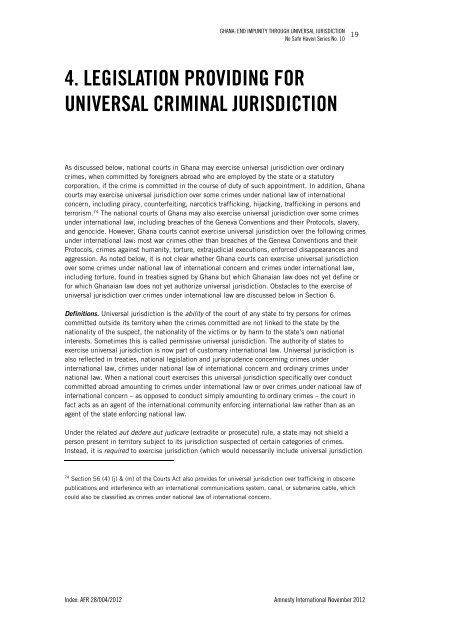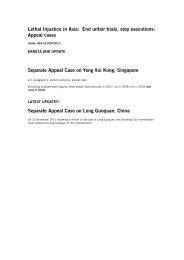Ghana - Amnesty International
Ghana - Amnesty International
Ghana - Amnesty International
You also want an ePaper? Increase the reach of your titles
YUMPU automatically turns print PDFs into web optimized ePapers that Google loves.
GHANA: END IMPUNITY THROUGH UNIVERSAL JURISDICTIONNo Safe Haven Series No. 10194. LEGISLATION PROVIDING FORUNIVERSAL CRIMINAL JURISDICTIONAs discussed below, national courts in <strong>Ghana</strong> may exercise universal jurisdiction over ordinarycrimes, when committed by foreigners abroad who are employed by the state or a statutorycorporation, if the crime is committed in the course of duty of such appointment. In addition, <strong>Ghana</strong>courts may exercise universal jurisdiction over some crimes under national law of internationalconcern, including piracy, counterfeiting, narcotics trafficking, hijacking, trafficking in persons andterrorism. 74 The national courts of <strong>Ghana</strong> may also exercise universal jurisdiction over some crimesunder international law, including breaches of the Geneva Conventions and their Protocols, slavery,and genocide. However, <strong>Ghana</strong> courts cannot exercise universal jurisdiction over the following crimesunder international law: most war crimes other than breaches of the Geneva Conventions and theirProtocols, crimes against humanity, torture, extrajudicial executions, enforced disappearances andaggression. As noted below, it is not clear whether <strong>Ghana</strong> courts can exercise universal jurisdictionover some crimes under national law of international concern and crimes under international law,including torture, found in treaties signed by <strong>Ghana</strong> but which <strong>Ghana</strong>ian law does not yet define orfor which <strong>Ghana</strong>ian law does not yet authorize universal jurisdiction. Obstacles to the exercise ofuniversal jurisdiction over crimes under international law are discussed below in Section 6.Definitions. Universal jurisdiction is the ability of the court of any state to try persons for crimescommitted outside its territory when the crimes committed are not linked to the state by thenationality of the suspect, the nationality of the victims or by harm to the state’s own nationalinterests. Sometimes this is called permissive universal jurisdiction. The authority of states toexercise universal jurisdiction is now part of customary international law. Universal jurisdiction isalso reflected in treaties, national legislation and jurisprudence concerning crimes underinternational law, crimes under national law of international concern and ordinary crimes undernational law. When a national court exercises this universal jurisdiction specifically over conductcommitted abroad amounting to crimes under international law or over crimes under national law ofinternational concern – as opposed to conduct simply amounting to ordinary crimes – the court infact acts as an agent of the international community enforcing international law rather than as anagent of the state enforcing national law.Under the related aut dedere aut judicare (extradite or prosecute) rule, a state may not shield aperson present in territory subject to its jurisdiction suspected of certain categories of crimes.Instead, it is required to exercise jurisdiction (which would necessarily include universal jurisdiction74Section 56 (4) (j) & (m) of the Courts Act also provides for universal jurisdiction over trafficking in obscenepublications and interference with an international communications system, canal, or submarine cable, whichcould also be classified as crimes under national law of international concern.Index: AFR 28/004/2012 <strong>Amnesty</strong> <strong>International</strong> November 2012
















